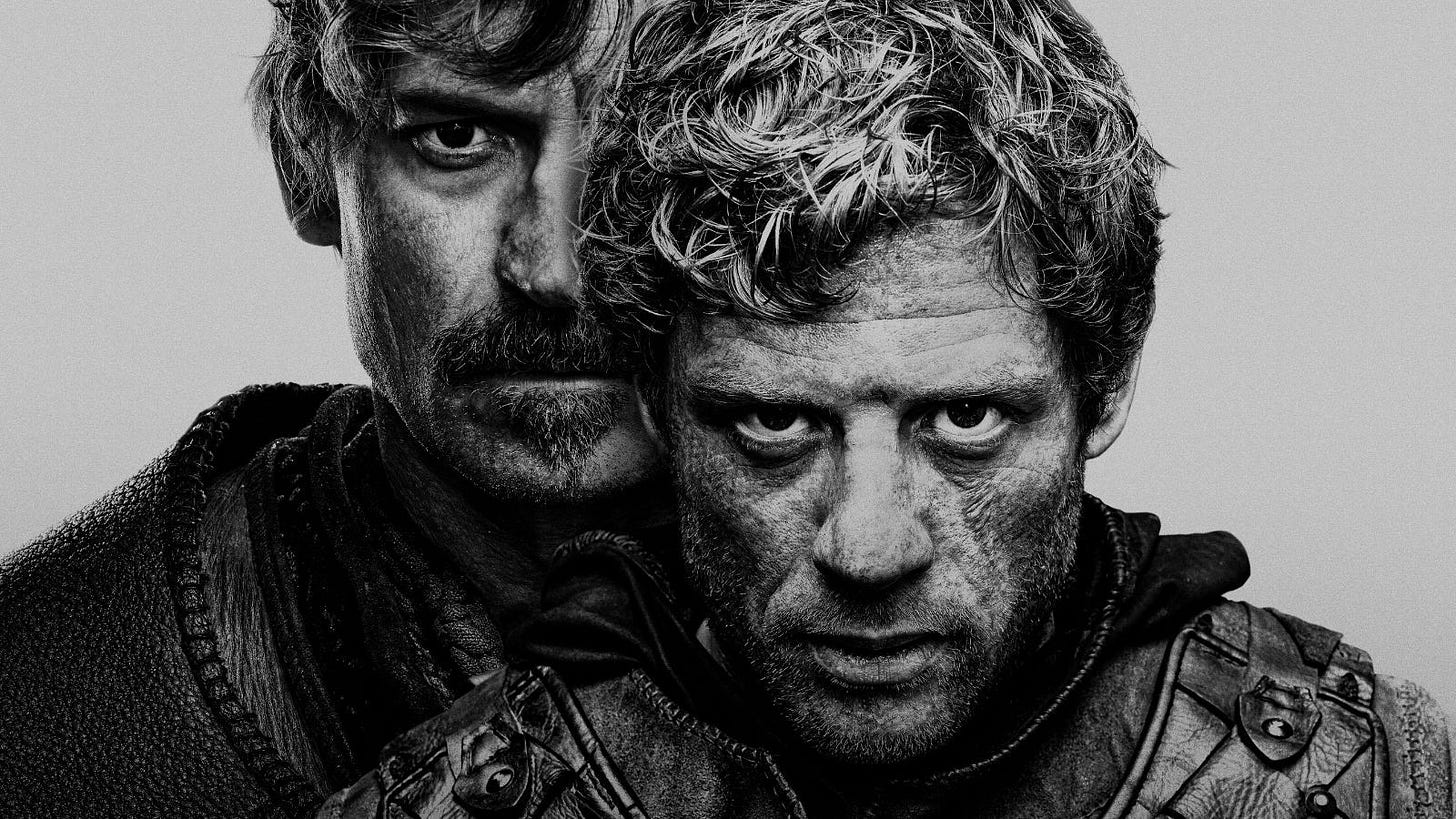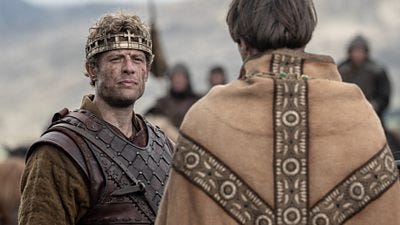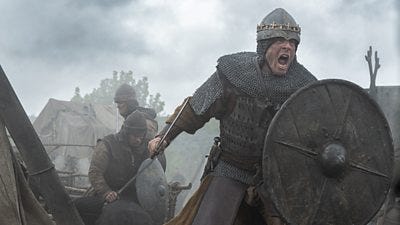King & Conqueror: James Norton Interview
New BBC drama King & Conqueror launches on iPlayer Sunday 24 August, with the first episode airing on BBC One that evening. Here, James Norton tells us more about what to expect...
King & Conqueror is the story of a clash that defined the future of a country – and a continent – for a thousand years, the roots of which stretch back decades and extend out through a pair of interconnected family dynasties, struggling for power across two countries and a raging sea.
Harold of Wessex (James Norton) and William of Normandy (Nikolaj Coster-Waldau) were two men destined to meet at the Battle of Hastings in 1066; two allies with no design on the English throne, who found themselves forced by circumstance and personal obsession into a war for possession of its crown.
James Norton (Harold of Wessex and Executive Producer)
What drew you to the part of Harold Godwinson?
Initially it was the story, rather than specifically Harold, that drew me to the project. We chatted about the idea for this show seven or eight years ago, and the first reaction I had was ‘how has this story not been told before in TV or film?’ It's one of the biggest dates we learn in history at school. It has defined so much of our culture, politics and law, the fabric of this country.
Then in terms of Harold, in those early chats, Mike [lead writer] had seen Harold as a brutish man, a ball of muscle, energy and aggression. Over the development process the character became more and more nuanced, and the relationships he has with Edith and his family allowed us a way into the complexity of this man and the reasons behind his relentless pursuit of power. Luckily by the end of the development process, it was a complete no-brainer for me – I was so right for Harold and Nikolaj, who came on a little bit later than I did, was so right for William.
How did you prepare to portray Harold? Did you do much research?
We’ve done so much work and research, and so much of that has come through Mike’s writing. I remember being constantly surprised reading scripts and saying ‘is this real? This seems completely mad,’ and invariably, he'd be like, ‘no, that is exactly what happened.’ It was extraordinary. There were obviously artistic licenses that we had to take, particularly in terms of the timeline, because you often have to condense chapters with historical dramas like this.
It was also about finding specificity and nuance. We know about the broad brush strokes of Stamford Bridge and the Battle of Hastings, but you don't really get much about an individual from the Bayeux Tapestry and the wider historical facts. The meat and substance is always found in the domestic space. Through Mike's incredible writing and his extraordinary research I had a very clear route into the man and his private world and his domestic space. I remember being on the battlefield as the embodiment of Harold with the benefit of a thousand years of hindsight and thinking ‘if only he knew how significant this particular moment was going to be.’
Did you have the opportunity to film any stunt work?
We had an amazing stunt coordinator called Jon Vidar. I know lots of people talk about this in terms of period drama, but we really did spend a lot of time and attention making it feel as authentic as possible – the mud and blood, the sweat and the tears – we didn’t want it to feel like a pristine, precious period drama. We wanted it to feel gritty.
The slow, sluggish movements of fighting in th
ose costumes was real. Jon’s team really took that to heart, and we worked really hard at making everything feel messy and of the period, and not sensationalist or overly choreographed. We trained hard, Nikolaj and I both did a lot of sessions. And a lot of horse riding!
Were there any funny or memorable moments on set?
The weather was always a challenge. It was impossible to predict what the weather was going to do and how to prepare for it – one day you'd need thermal pads underneath your armour, and the next you'd be desperate for a fan and cold patches on your neck. I became a part of this community of cold swimmers in Reykjavik. They were hardcore, I became friends with some of them. Wherever you are in Iceland, you're always near a beach, pond, pool or somewhere to swim, so for me it was a dream.
Could you tell us about the relationship between Harold and William? What was it like working with Nikolaj?
We know they became friends. They were kindred spirits in this new generation of leaders in Europe, and the fact that they fought alongside each other, brothers in arms, in Normandy, gives us a lot in terms of how close they had become, and then how this reversed by the time they got to the Battle of Hastings. Nikolaj is a brilliant actor and a wonderful man. We had Team Harold and Team William – we would jokingly spar about which storyline was more interesting.
We playfully leant into the head butting that Harold and William naturally do in the script, and as a result, there was a gentle, boyish competitiveness between the two of us. We hung out a lot and went jet skiing – I remember racing him across the water and thinking ‘this is very Harold of me!’ But generally a happy and healthy working relationship, full of mutual respect. He’s a real powerhouse in the industry, his commitment to directing episode five was extraordinary. The actors, including me, loved being directed by him, because it was both well prepared and specific, but when you have an actor directing there's a certain empathy that comes through.
I met President Emmanuel Macron recently at the event at the British Museum where the Bayeux Tapestry is being moved to, and I was very quick to reassure him that we had told the French story, the Norman story, with as little bias as possible. There are a lot of stories about William post the Battle of Hastings itself, and how he acted pretty monstrously, but there's no doubt that he had his own domestic space, his relationship with Matilda and his son. Nikolaj brought so much complexity to that role, and as a result, I think that the show feels balanced.
We didn't want one hero or one villain, we wanted the audience to be split and we wanted people to sit on the sofa and have someone on Team Harold and someone on Team William. I said to Macron: ‘I promise you that we have been fair in depicting both sides of the story’, and a lot of that was to do with Nikolaj’s brilliant, sensitive performance.
Was what the experience being on set like?
Because of the nature of the shoot, there were inevitably days which were the ‘Godwinson days’, and then William's family and his days. And so, without being in any way exclusive, there were little tribes which kind of emerged. We became a little family, and that has kind of continued to exist, we've had little Godwin family dinners.
I always think that to do our job well, a lot of it is about the connections that you make off camera. There was just a lot of giggling, we just could not stop occasionally misbehaving! The reality of our friendships then became the reality of our dynamic, where art meets life and vice versa. And we had a lot of time when they were shooting the Norman storylines, so as a family we would go on trips. Emily [Beecham], Clare [Holman], Juliet [Stevenson] and I went up to the middle of the mountains and swam in a geothermal river.
Could you tell us about the female characters in the series?
I think the beauty of Emily [Beecham] and Clémence’s [Poésy] performances is that it feels like two couples – it’s not so much the story of William and Harold. The story sheds light on the fact that their decisions were informed largely by their wives and these profound relationships. In Emily and Clémence, we had these actresses who are so intelligent, powerful and formidable.
They wanted to honour those roles and tell that story. The other person who must be credited for that that is Kitty Kaletsky [executive producer]. Kitty realised very early on that this wasn't a story about two men, this was a story about two couples, and that was when Edith and Matilda really came into their own.
Why do you think the story of 1066 is still so relevant?
It’s a story about power – men seeking power and how dangerous that can become. In the world we live in now, that is a theme which we are only too familiar with. The danger of power ending up in the wrong hands and the ego driven, hubristic pursuit of power at the expense of other people and the greater good of a country. I hope that this will be a kind of catalyst for conversation around that, but I also hope that people will take away eight hours of really entertaining TV.
It’s way more twisty than I think people will think, because their experience of the history books is probably more dry than what this show offers.
What was it like being executive producer alongside starring in the series?
In terms of producing – talking about power! – I loved it. It was a very humbling experience walking onto those sound stages and seeing the world that we had built, these huge castles and interiors. It was Rob Taylor as well, our producing partner, who was massively influential in making the show happen. We're all relatively earlyish in our producing careers, and so it was a massive moment for us.
To Kitty's credit, I had to step back from producing responsibilities when we started shooting because I had to concentrate on Harold. I am incredibly proud of what we made and of the process of making it – how harmonious, enjoyable and creative that was.
All episodes are available on BBC iPlayer from 6am on Sunday 24 August, with the first episode airing on BBC One that evening.






